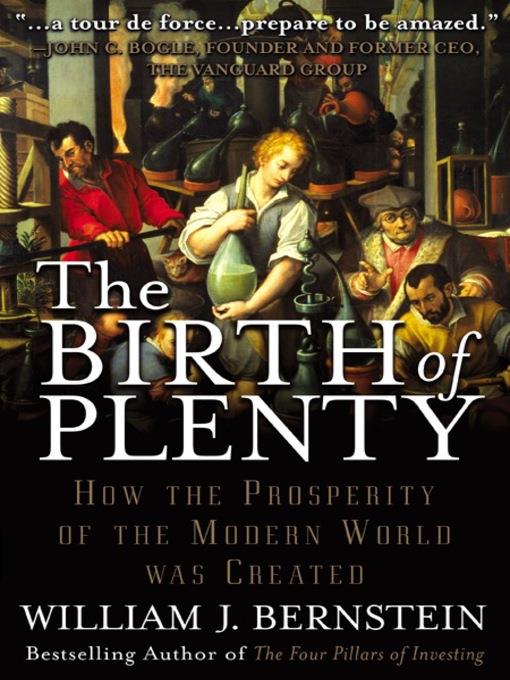
The Birth of Plenty
How the Prosperity of the Modern World was Created
کتاب های مرتبط
- اطلاعات
- نقد و بررسی
- دیدگاه کاربران
نقد و بررسی

April 5, 2004
Rather than dry academic analysis, Bernstein, in his second book (after Four Pillars of Investing
), has created a vital, living text—a cogent, timely journey through the economic history of the modern world. He identifies institutions ("the framework within which human beings think, interact and carry on business") as the engines of prosperity. Boiled down to four (property rights, the scientific method, capital markets and communications), these institutions come from ideas and practices that bubbled forth over the course of hundreds of years. Bernstein is clear in explaining that the civilizations that develop and implement these systems thrive, and that those that do not, perish. The Spanish empire, for example, had most of these but lacked effective capital markets. When the gold from the New World dried up, the empire essentially went broke. By 1840 the British had all of these institutions in place, economic growth exploded and the lot of the common man was immensely improved. Today, the U.S. faces the challenge of sustaining prosperity in the face of rapid technological change. Though fairly Eurocentric in focus, Bernstein's narrative tracks the development of these essential ingredients to prosperity over a global landscape—the great dynasties of China get plenty of attention here, as do the Japanese. Solid writing and poignant assessments of the economic players throughout time give texture and flavor to Bernstein's argument: he describes the medieval relationship between the various European kingdoms and the Vatican as "a holy shakedown racket." Packed with information and ideas, Bernstein's book is an authoritative economic history, accessible and thoroughly entertaining.

May 15, 2004
Bernstein's (The Four Pillars of Investing) premise here is that prosperity will flow "once a society acquires the four crucial factors-property rights, scientific rationalism, capital markets, and modern transportation and communication." In the first of three sections, the author covers the sources of growth. He chronicles the history of property ownership, technological invention and its impact on prosperity, the roots of the capital markets, and the benefits of machines to production. Then he profiles countries that have been historically considered economically successful, such as Holland and Japan, and he theorizes about why some areas, such as Africa and Latin America, have been left behind. Bernstein then applies the concepts discussed to modern-day life. He discusses such issues as the way in which prosperity contributes to a country's well-being and what inequalities can result from economic growth. This fascinating, well-written look at how the concept of prosperity has evolved over centuries is recommended for all collections.-Stacey Marien, American Univ., Washington, DC
Copyright 2004 Library Journal, LLC Used with permission.

April 15, 2004
With the advent of computers, we tend to think that technology is changing at a more rapid pace than ever. Bernstein, a noted financial expert, reminds us that the invention of the locomotive and the telegraph prior to 1850 had a much greater impact on the lives and well-being of the people of that era. According to his analysis, there was little change in the world's standard of living from the dawn of recorded history all the way to 1820, with technological progress moving in reverse as often as forward. In a very solid review of economic history, Bernstein examines the four factors that fell into place to create a formula for human progress: property rights, scientific rationalism, capital markets, and transportation and communication. From the rise of common law to the invention of the steam engine, from the creation of currencies to shipbuilding, this is an in-depth history of the rise of prosperity. It is topical, as well, examining the impact of economic progress on "happiness," trends in income inequality, and the opposing views of the Christian and Muslim mindsets.(Reprinted with permission of Booklist, copyright 2004, American Library Association.)

























دیدگاه کاربران